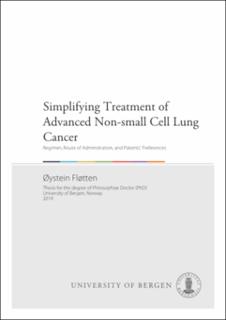Simplifying Treatment of Advanced Non-small Cell Lung Cancer : Regimen, Route of Administration, and Patients' Preferences
Doctoral thesis
Permanent lenke
https://hdl.handle.net/1956/21347Utgivelsesdato
2019-10-17Metadata
Vis full innførselSamlinger
Sammendrag
Lung cancer is the cancer disease that takes the most lives. Non-small cell lung cancer (NSCLC) is the most common type, and more than half have an incurable disease at the time of diagnosis. Chemotherapy can halt the disease but is only moderately effective, has some side effects and requires regular hospital visits for intravenous infusions. The aim of the current work was to find a more tolerable treatment that is easier to administer and to explore how patients balance the benefits and disadvantages of treatment. We conducted a national study comparing a chemotherapy combination with fewer side effects (vinorelbine and gemcitabine; VG) with the most commonly used combination in Norway (vinorelbine and carboplatin; VC). Both regimens had a 3-week cycle, with carboplatin given on day 8 and the other drugs on days 1 and 8. The patients went through three cycles. We used vinorelbine in capsule form (oral vinorelbine). This allowed comparison with previous studies in Norway that used intravenous vinorelbine. We also interviewed patients about how large the treatment effect should be to accept treatment. The VG combination was no better than VC, in terms of overall survival and health related quality of life (HRQoL), and VC remained the preferred regimen for most patients. Oral vinorelbine had a favourable toxicity profile without compromising survival outcomes. Oral vinorelbine have replaced intravenous vinorelbine on day 8, which allow for home treatment and simplifying the treatment. Studying patients’ attitudes to treatment at the time of diagnosis was complicated. This study suggested that most patients accepted the planned treatment even if the benefits were minimal.
Består av
Paper I: O. Flotten, B.H. Gronberg, R. Bremnes, T. Amundsen, S. Sundstrom, H. Rolke, K. Hornslien, T. Wentzel-Larsen, U. Aasebo, C. von Plessen. Vinorelbine and gemcitabine vs vinorelbine and carboplatin as first-line treatment of advanced NSCLC. A phase III randomised controlled trial by the Norwegian Lung Cancer Study Group, Br. J. Cancer, 107 (2012) 442–447. The article is available at: https://hdl.handle.net/11250/2994855Paper II: O. Flotten, B.H. Gronberg, S. Sundstrom, N. Helbekkmo, R. Bremnes, C. von Plessen. Oral versus intravenous vinorelbine in advanced NSCLC—a retrospective comparison, Cancer Treatment and Research Communications, 9 (2016) 15–20. The article is available in the main thesis. The article is also available at: https://doi.org/10.1016/j.ctarc.2016.06.005.
Paper III: O. Flotten, M. Aanerud, C. von Plessen, Informed patients with newly diagnosed advanced NSCLC accept chemotherapy for little or nil benefit. The article is not available in BORA.
